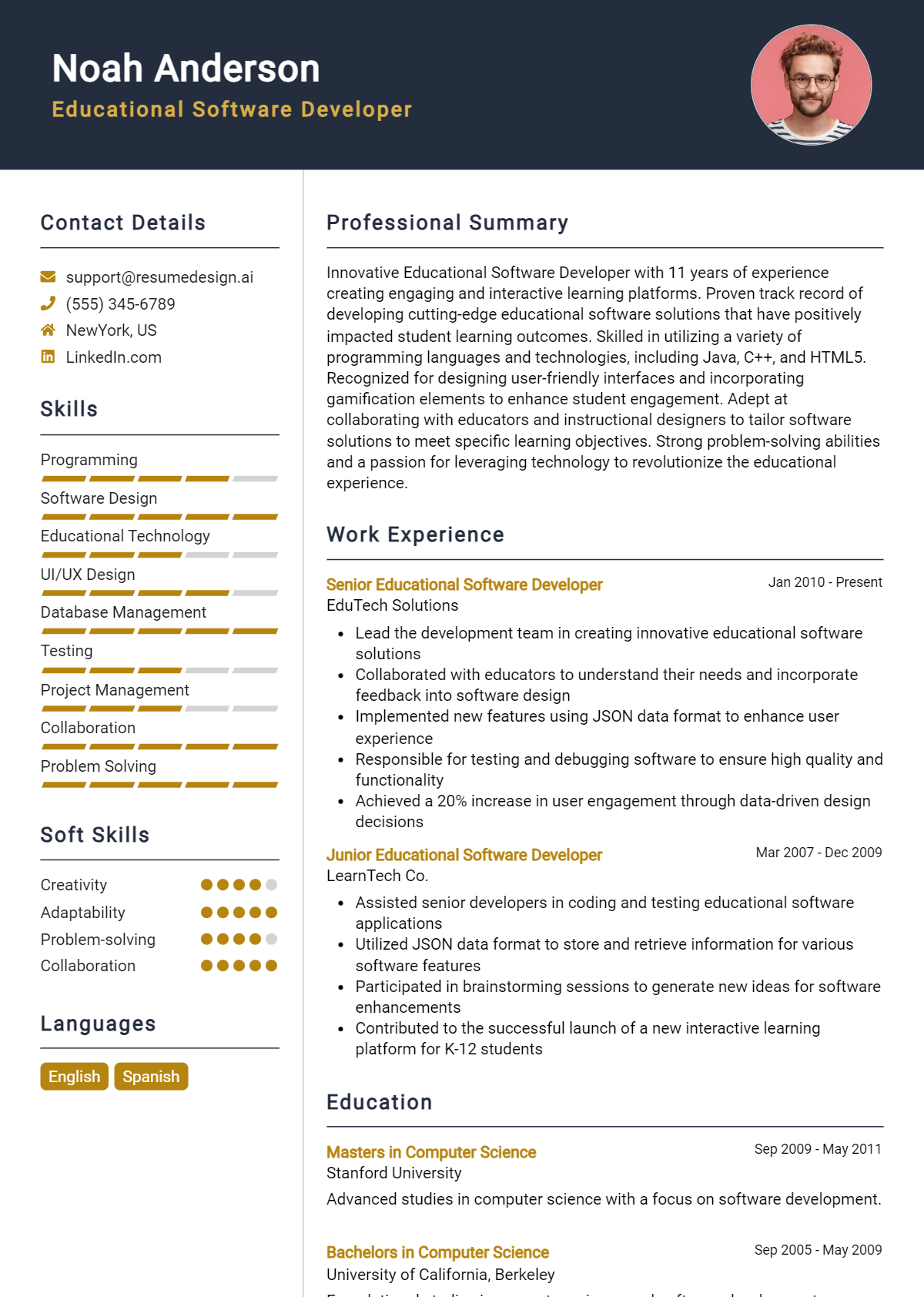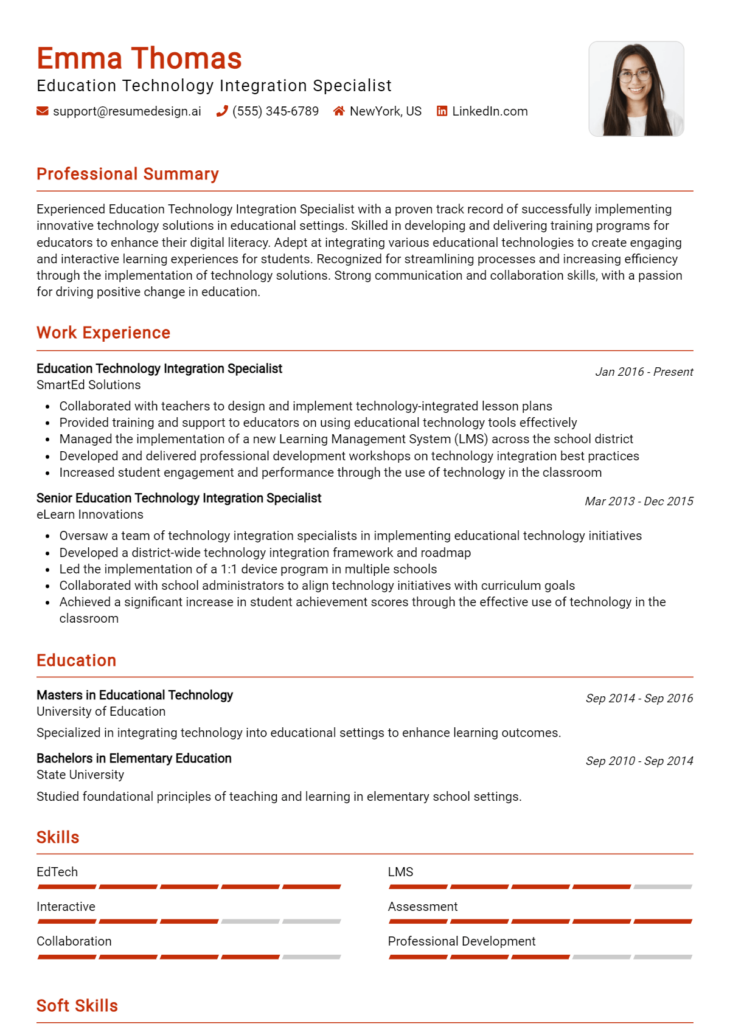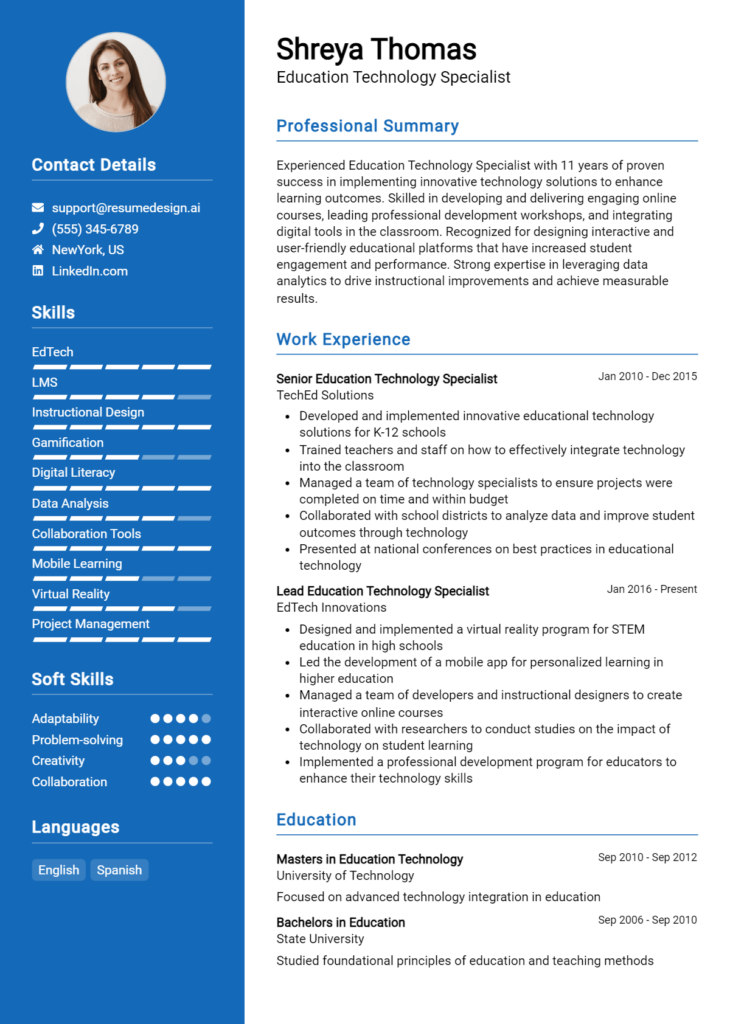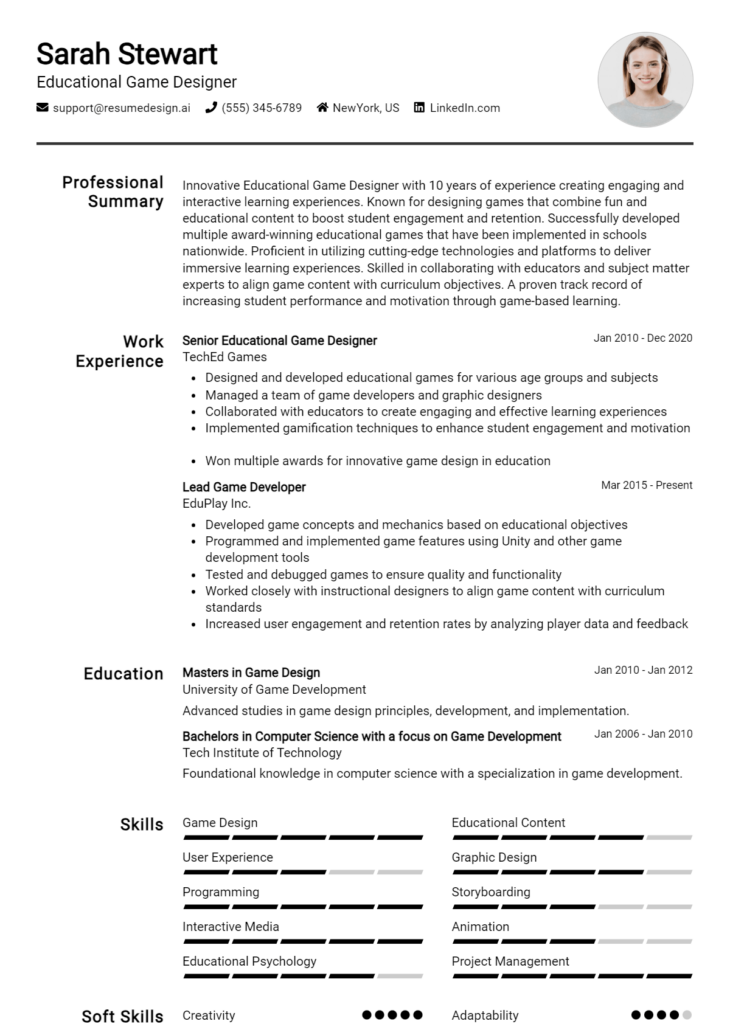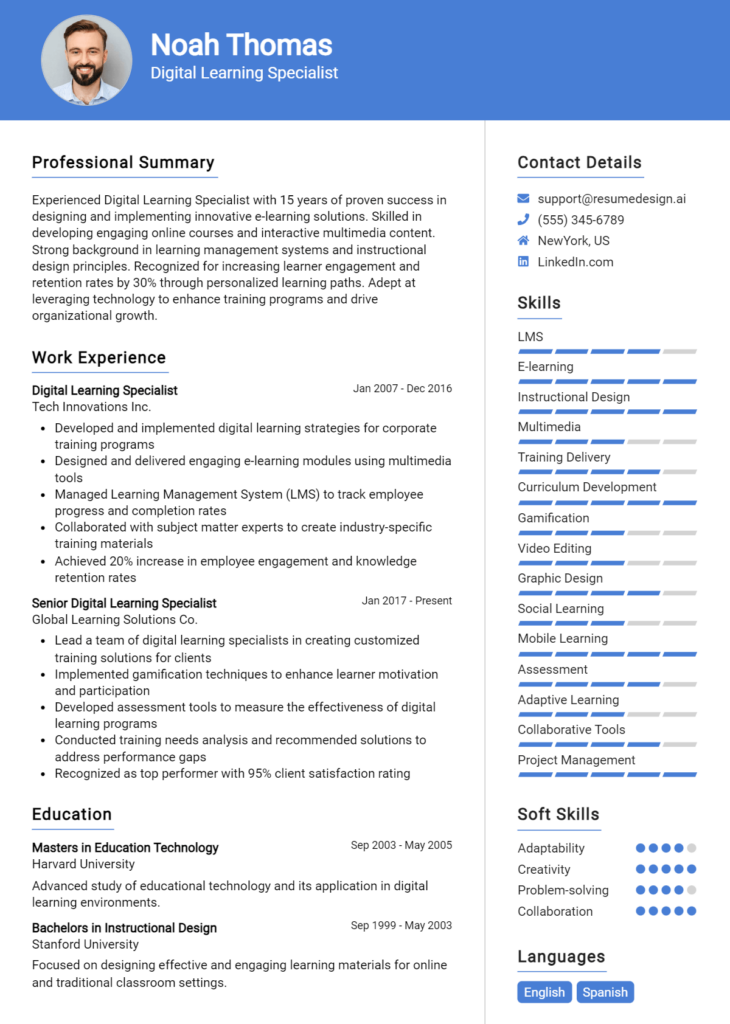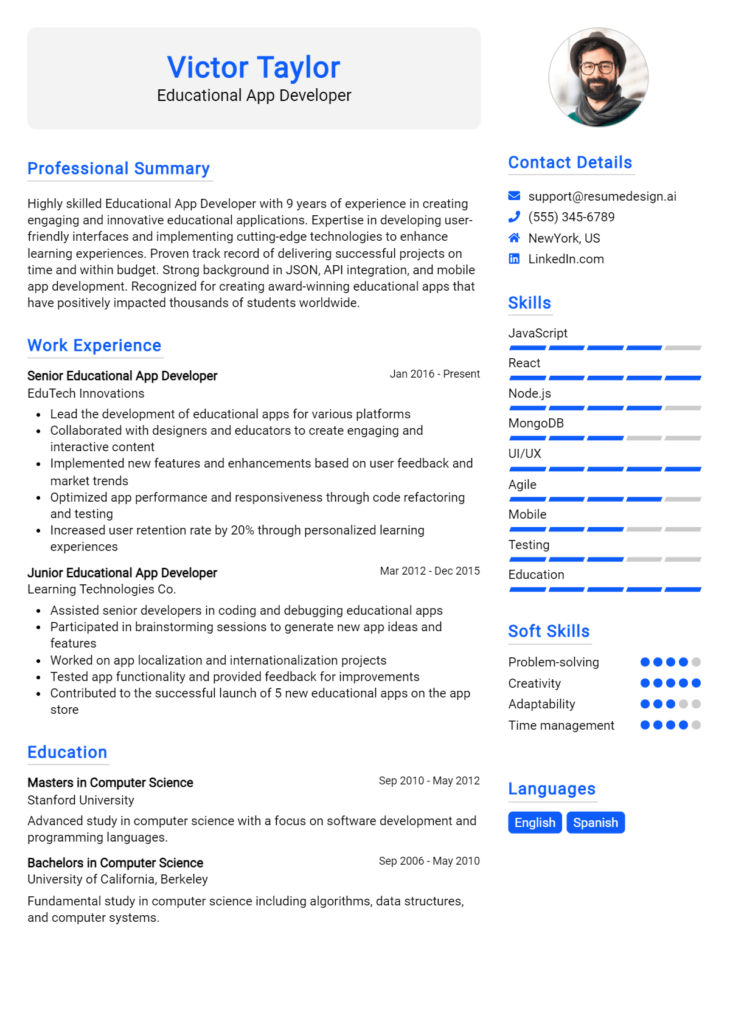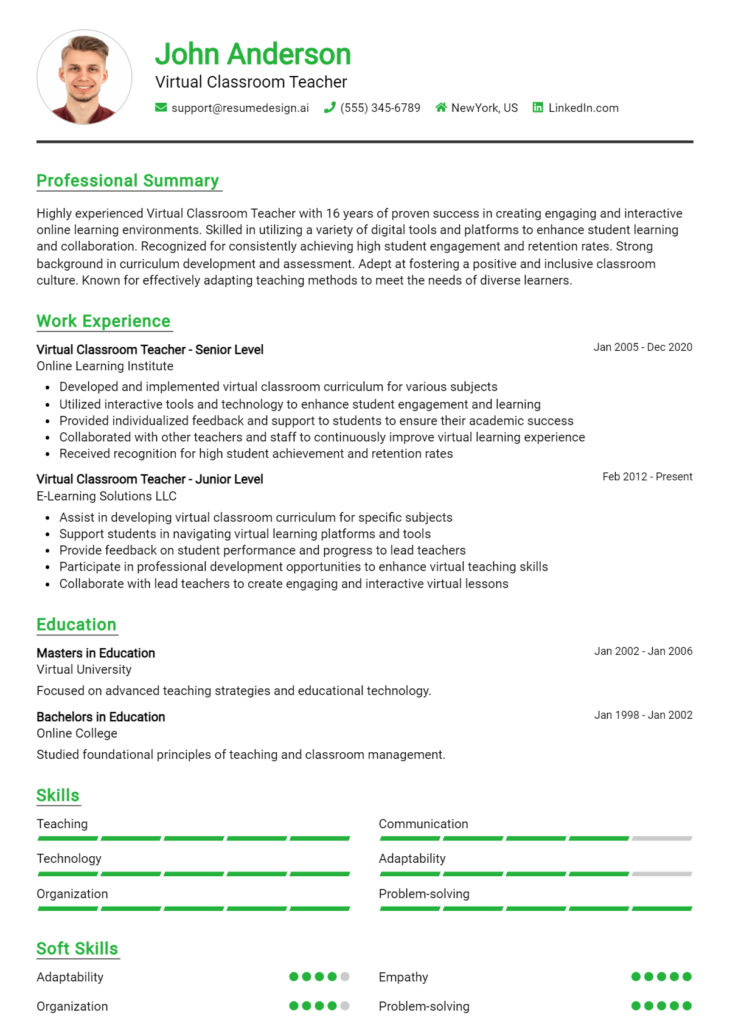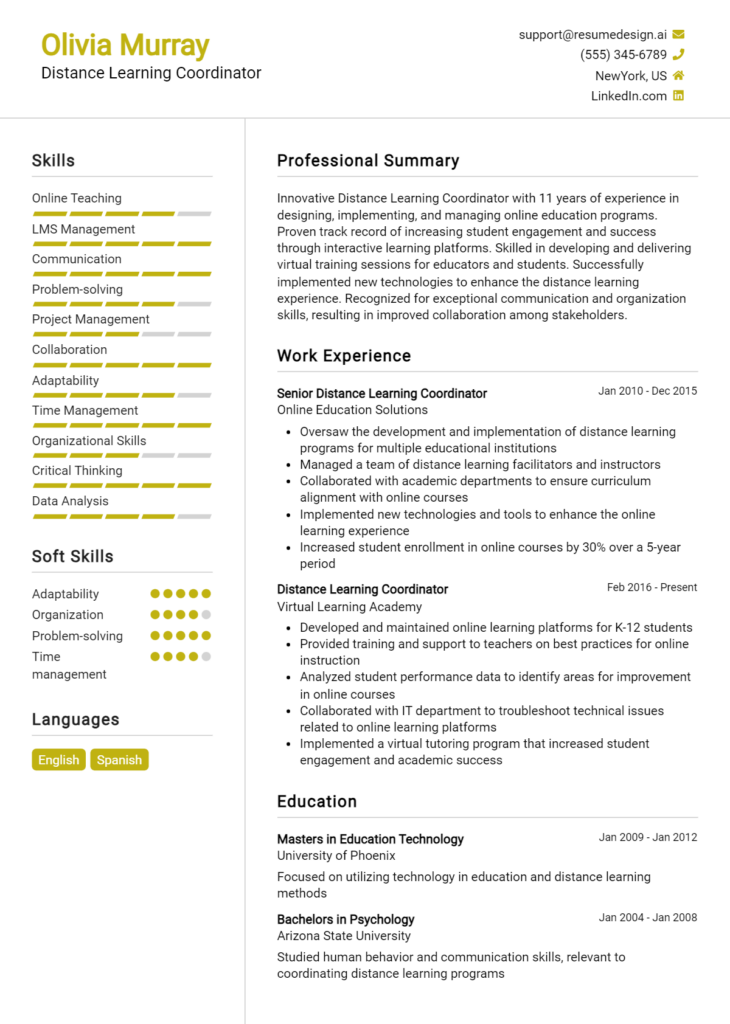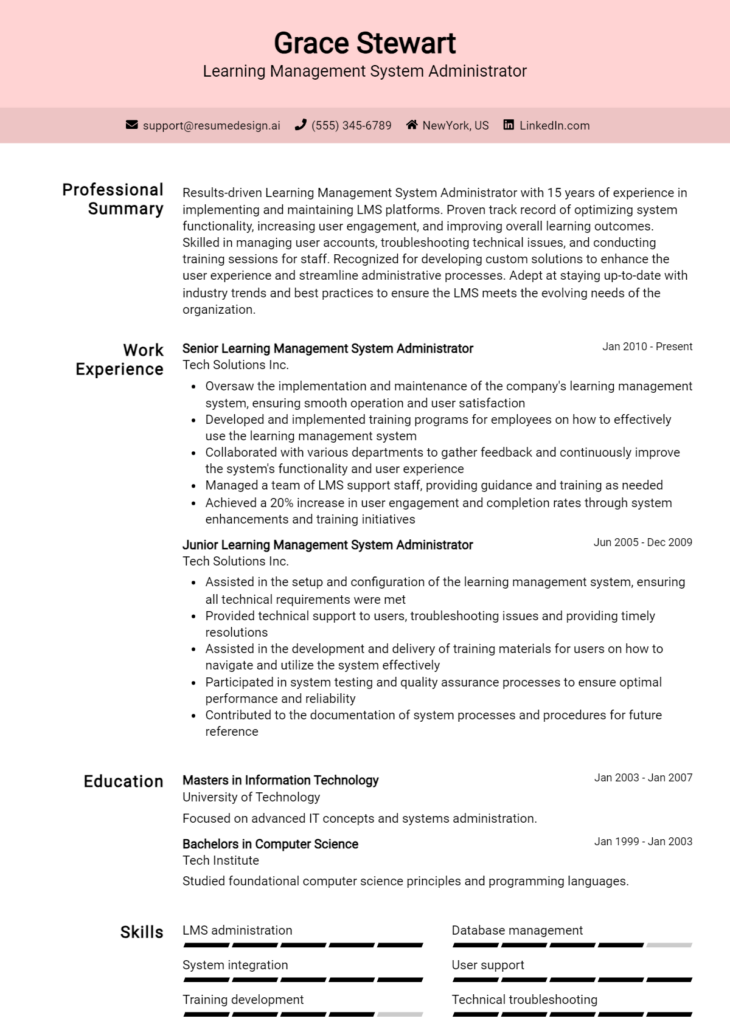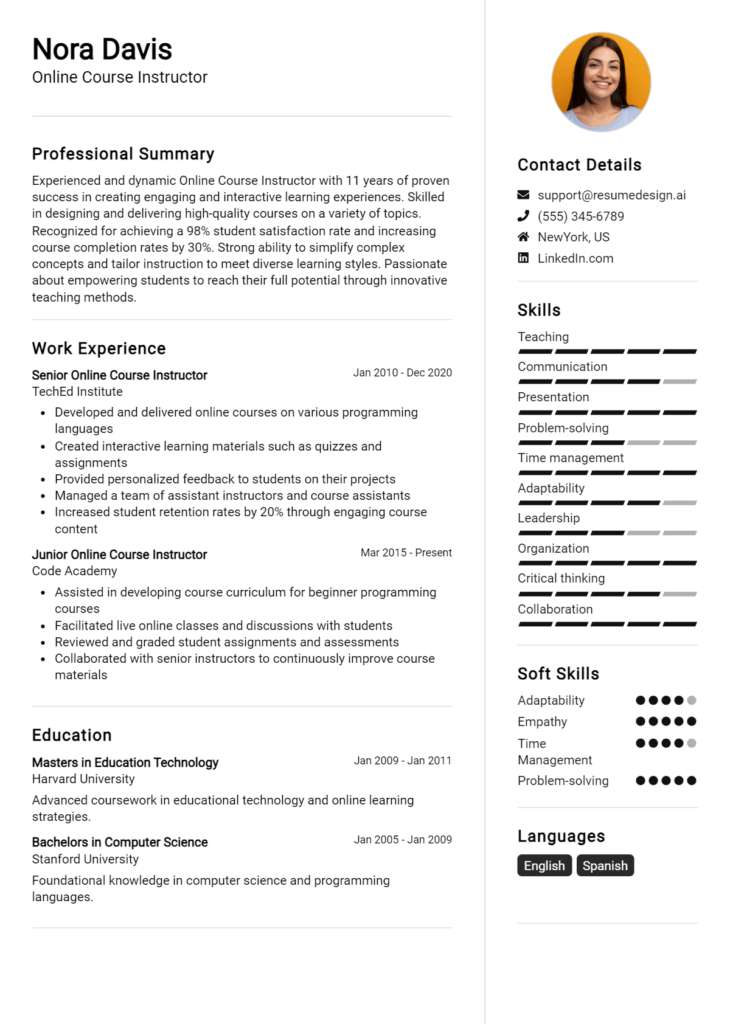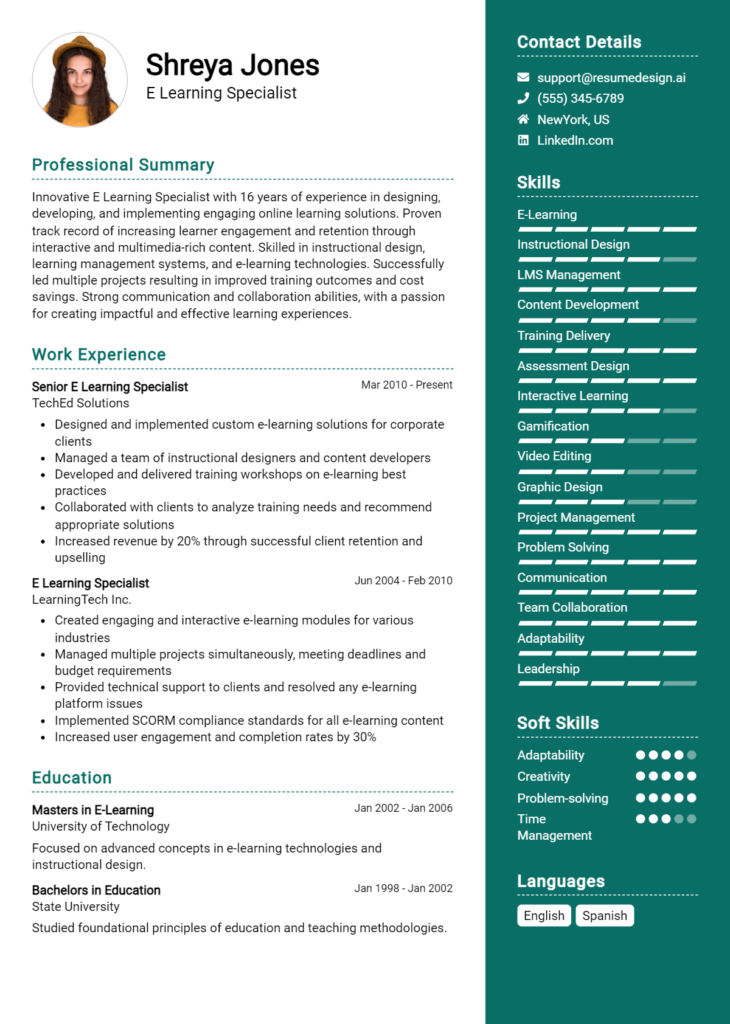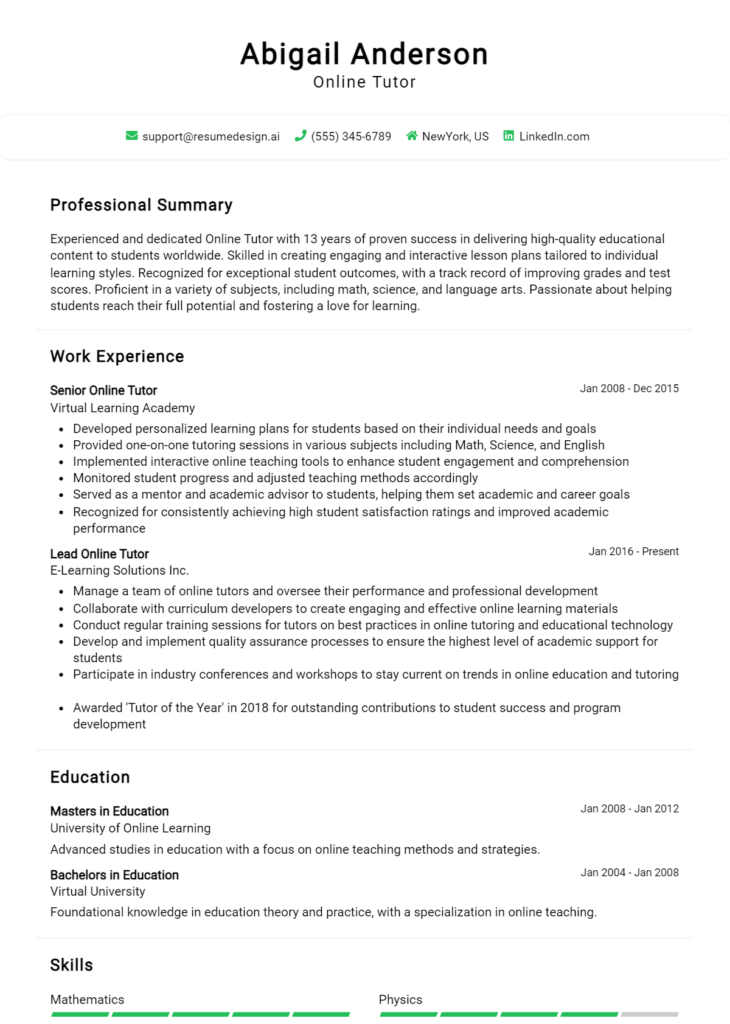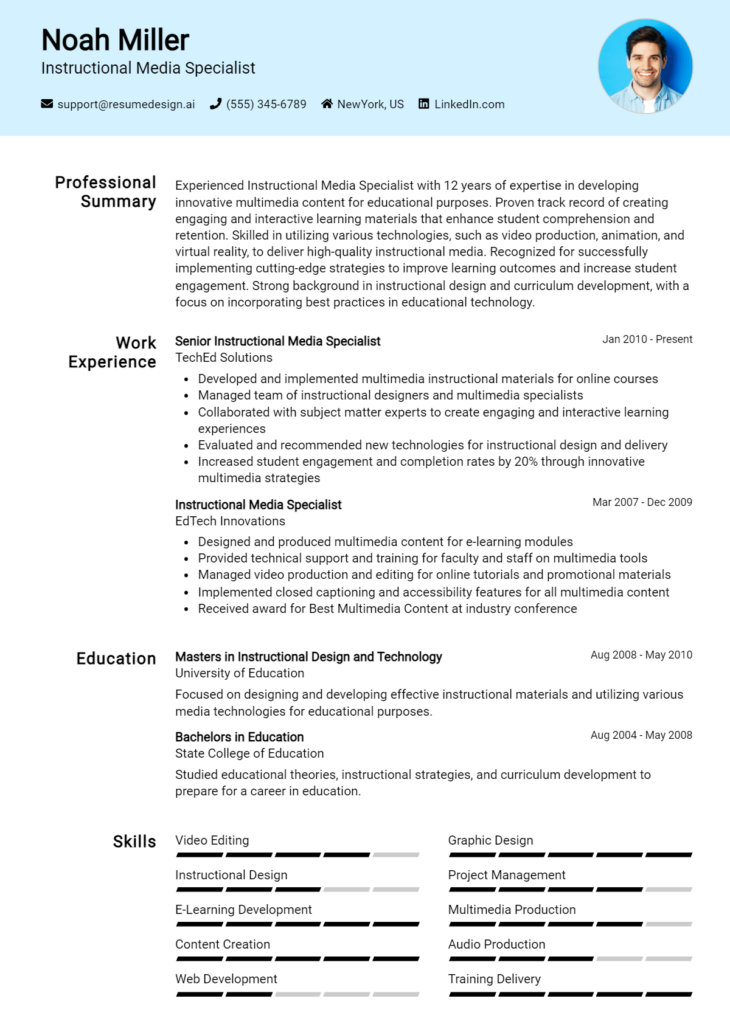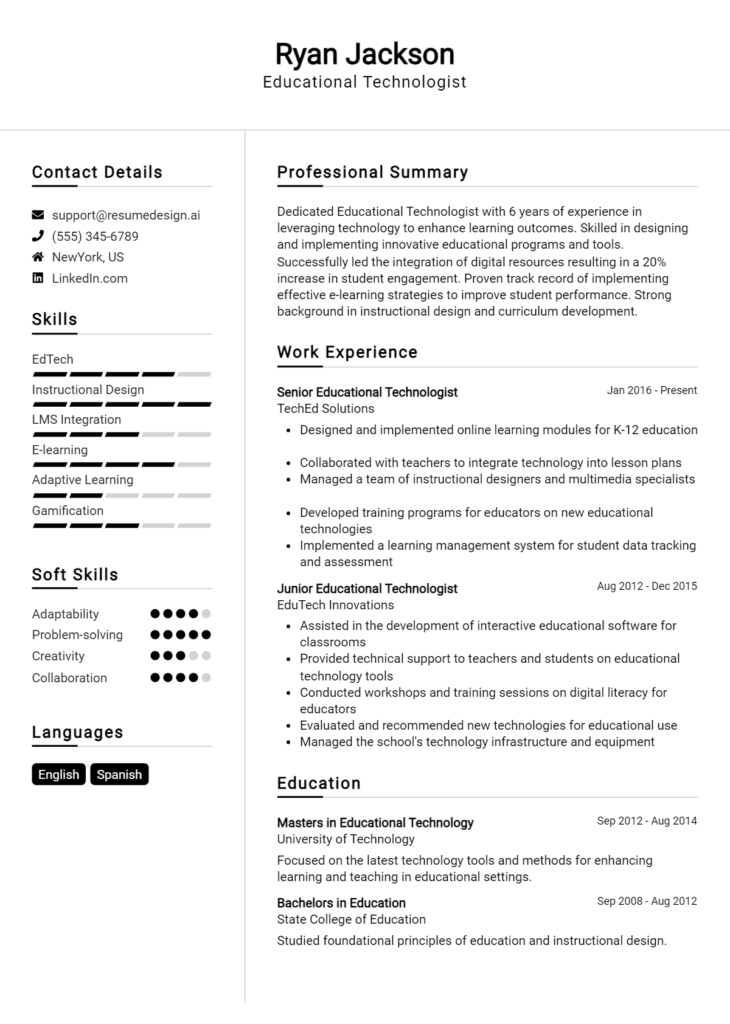Educational Software Developer Core Responsibilities
An Educational Software Developer plays a crucial role in designing, developing, and maintaining software applications tailored for educational environments. This professional bridges the gap between educational needs and technical solutions, requiring strong programming skills, operational insight, and adept problem-solving abilities. Effective communication with educators and IT teams ensures that software aligns with pedagogical goals. A well-structured resume highlighting these skills can significantly enhance job prospects and contribute to the organization's success in delivering impactful educational tools.
Common Responsibilities Listed on Educational Software Developer Resume
- Design and develop educational software applications to enhance learning experiences.
- Collaborate with educators to gather requirements and understand user needs.
- Conduct usability testing and gather feedback for ongoing improvements.
- Ensure software compliance with educational standards and regulations.
- Integrate multimedia elements and interactive features into applications.
- Provide technical support and training for users of the software.
- Debug and troubleshoot software issues to ensure optimal performance.
- Document software development processes and maintain project documentation.
- Stay updated with emerging technologies and educational trends.
- Participate in cross-functional teams to align software development with educational objectives.
- Manage project timelines and deliverables effectively.
- Analyze data to evaluate the effectiveness of educational software solutions.
High-Level Resume Tips for Educational Software Developer Professionals
In today's competitive job market, a well-crafted resume is crucial for Educational Software Developer professionals looking to make a strong first impression on potential employers. Your resume serves as a gateway to showcase not just your technical skills but also your achievements and contributions to the field of educational technology. It is essential that your resume reflects your unique qualifications, aligning closely with the job description and demonstrating how you can add value to an organization. This guide will provide practical and actionable resume tips specifically tailored for Educational Software Developer professionals, ensuring you stand out in a crowded candidate pool.
Top Resume Tips for Educational Software Developer Professionals
- Tailor your resume to each job description by incorporating relevant keywords and phrases to match the specific requirements of the position.
- Highlight your technical skills prominently, including programming languages, software development methodologies, and tools that are pertinent to educational software.
- Showcase relevant experience by detailing past projects, internships, or positions that directly relate to educational software development.
- Quantify your achievements with metrics, such as user engagement rates, project completion times, or improvements in learning outcomes, to demonstrate your impact.
- Include a summary statement at the top of your resume that encapsulates your career objectives and what you bring to the table as an Educational Software Developer.
- List any certifications or professional development courses that are relevant to educational technology to enhance your credibility.
- Utilize action verbs in your job descriptions to convey your responsibilities and accomplishments more dynamically.
- Keep your resume concise and focused, ideally one page, ensuring that every word adds value to your candidacy.
- Incorporate links to your portfolio or examples of your work, such as applications or educational tools you’ve developed, to provide tangible evidence of your abilities.
By implementing these tips, you can significantly increase your chances of landing a job in the Educational Software Developer field. A polished and targeted resume not only highlights your skills and achievements but also positions you as a strong candidate capable of making meaningful contributions to the educational technology landscape.
Why Resume Headlines & Titles are Important for Educational Software Developer
In the competitive landscape of educational technology, having a standout resume is crucial for an Educational Software Developer. One of the most effective ways to capture the attention of hiring managers is through a compelling resume headline or title. A strong headline not only summarizes a candidate's key qualifications in a concise and impactful manner but also serves as the first impression that can determine whether a resume gets further consideration. By distilling expertise into a single phrase, candidates can effectively communicate their relevance to the position and entice hiring managers to delve deeper into their application.
Best Practices for Crafting Resume Headlines for Educational Software Developer
- Keep it concise: Aim for a headline that is no longer than a single sentence.
- Be role-specific: Tailor the headline to reflect the specific position you are applying for.
- Highlight key skills: Focus on the most relevant skills and technologies that align with the job description.
- Use impactful language: Choose powerful words that convey your expertise and experience.
- Avoid jargon: Use clear and straightforward language that can be easily understood.
- Showcase achievements: If possible, incorporate quantifiable achievements to demonstrate your value.
- Make it unique: Stand out by avoiding clichés and generic phrases that lack specificity.
- Align with the company's goals: Reflect how your skills can contribute to the company's mission in the headline.
Example Resume Headlines for Educational Software Developer
Strong Resume Headlines
Innovative Educational Software Developer with 5+ Years of Experience in E-Learning Solutions
Full-Stack Developer Specializing in Adaptive Learning Technologies and User-Centric Design
Passionate Software Engineer Committed to Enhancing Learning Outcomes Through Technology
Weak Resume Headlines
Software Developer Looking for Opportunities
Entry-Level Developer
The strong resume headlines are effective because they are specific, highlighting relevant experience and skills that directly relate to the role of an Educational Software Developer. They provide a clear snapshot of the candidate's qualifications and create a sense of professionalism and expertise. In contrast, the weak headlines fail to impress due to their vagueness and lack of detail, leaving hiring managers with little insight into the candidate's capabilities or relevance to the position, ultimately leading to a missed opportunity for the applicant.
Writing an Exceptional Educational Software Developer Resume Summary
A well-crafted resume summary is essential for an Educational Software Developer as it serves as the first impression on hiring managers. This brief introduction quickly showcases the applicant's key skills, relevant experience, and notable accomplishments, making it crucial for capturing attention in a crowded job market. A strong summary should be concise, impactful, and tailored to the specific job description, ensuring that it highlights what makes the candidate a perfect fit for the role. By effectively summarizing qualifications, the candidate increases their chances of being invited for an interview.
Best Practices for Writing a Educational Software Developer Resume Summary
- Quantify Achievements: Use specific figures to highlight your contributions, such as the number of users impacted or percentage improvements.
- Focus on Relevant Skills: Highlight key technical and soft skills that align with the job description, such as programming languages or teamwork abilities.
- Tailor the Summary: Customize your summary for each job application to ensure it addresses the specific requirements and preferences of the employer.
- Keep it Concise: Aim for 2-4 sentences that deliver maximum impact without overwhelming the reader.
- Use Action Words: Start sentences with strong verbs that convey your proactive approach, such as "developed," "designed," or "implemented."
- Showcase Key Accomplishments: Highlight standout projects or awards that demonstrate your expertise and value to potential employers.
- Avoid Jargon: While technical language can be necessary, ensure your summary remains accessible to a broad audience, including HR professionals.
- Maintain Professional Tone: Keep the language formal and focused, avoiding casual phrases or personal anecdotes that detract from professionalism.
Example Educational Software Developer Resume Summaries
Strong Resume Summaries
Dynamic Educational Software Developer with over 5 years of experience in designing interactive e-learning platforms that improved student engagement by 30%. Proficient in Java, Python, and HTML, with a track record of delivering projects on time and within budget.
Results-driven developer skilled in creating adaptive learning technologies, successfully enhancing course completion rates by 25% through personalized user experiences. Excels in collaborative environments and agile methodologies.
Innovative Educational Software Developer with expertise in mobile application development, recognized for leading a team that launched a language learning app with over 10,000 downloads within the first month. Strong background in UX/UI design.
Detail-oriented software engineer with a Master's in Educational Technology and a proven history of developing software solutions that increased instructor efficiency by 40%. Adept at integrating multimedia content into learning management systems.
Weak Resume Summaries
Experienced developer looking for a position in the educational sector. Good with software development.
I have a variety of skills in programming and software design. I am seeking a role that allows me to use my experience.
The strong resume summaries demonstrate quantifiable results, specific technical skills, and direct relevance to the educational software development role, making them compelling to hiring managers. In contrast, the weak summaries lack specificity, fail to convey measurable achievements, and appear too generic, which diminishes their effectiveness in capturing interest.
Work Experience Section for Educational Software Developer Resume
The work experience section of an Educational Software Developer resume is crucial as it not only showcases a candidate's technical skills but also reflects their ability to manage teams and deliver high-quality products in a fast-paced educational technology environment. This section provides potential employers with insight into the candidate's hands-on experience, demonstrating how they have applied their knowledge in real-world scenarios. By quantifying achievements and aligning their experience with industry standards, candidates can effectively illustrate their value and readiness for the role.
Best Practices for Educational Software Developer Work Experience
- Highlight relevant technical skills and programming languages used in past roles.
- Quantify achievements with specific metrics, such as increased user engagement or improved system performance.
- Emphasize collaboration by detailing team projects and your role within those teams.
- Use action verbs to describe accomplishments and responsibilities clearly.
- Tailor your work experience to align with the job description and required qualifications of the position.
- Include any leadership roles taken, such as leading a project or mentoring junior developers.
- Showcase any experience with educational standards, curricula, or learning management systems.
- Keep descriptions concise and focused on relevant experiences that demonstrate your problem-solving abilities.
Example Work Experiences for Educational Software Developer
Strong Experiences
- Led a team of 5 developers to create a learning management system that improved course completion rates by 30% within the first semester of launch.
- Developed an interactive educational app that received a 4.8-star rating on the App Store, increasing engagement by 50% among students.
- Implemented an automated testing framework that reduced bug reports by 40%, significantly improving product reliability.
- Collaborated with educators to design a curriculum-aligned assessment tool, resulting in a 25% decrease in grading time for teachers.
Weak Experiences
- Worked on various projects related to software development.
- Assisted in coding tasks for educational software.
- Participated in team meetings and discussions.
- Helped with troubleshooting issues in software applications.
The examples provided are considered strong because they highlight specific achievements with quantifiable outcomes, demonstrate technical leadership, and reflect effective collaboration. In contrast, the weak experiences lack detail and clarity, failing to convey the candidate's impact or contributions to their previous roles, making it difficult for potential employers to assess their qualifications effectively.
Education and Certifications Section for Educational Software Developer Resume
The education and certifications section of an Educational Software Developer's resume plays a crucial role in demonstrating the candidate's foundational knowledge, specialized skills, and commitment to professional development. This section not only showcases the academic background that supports the technical expertise necessary for the role but also highlights industry-relevant certifications that validate the candidate's abilities. By providing details about relevant coursework, specialized training, and ongoing educational efforts, candidates can significantly enhance their credibility and showcase their alignment with the demands of the job. A well-structured education and certifications section can make a strong impression on potential employers, indicating the candidate's dedication to excellence in the field of educational software development.
Best Practices for Educational Software Developer Education and Certifications
- Prioritize relevant degrees such as Computer Science, Education Technology, or Software Engineering.
- Include industry-recognized certifications such as Certified ScrumMaster (CSM) or Microsoft Certified: Azure Developer Associate.
- Describe relevant coursework that demonstrates expertise in areas like instructional design, programming languages, or database management.
- Highlight any specialized training or workshops that pertain to educational software tools and technologies.
- Keep the section organized and easy to read, using bullet points for clarity.
- Be specific about the level of certification (e.g., beginner, intermediate, expert) to indicate proficiency.
- Consider including online course certifications from reputable platforms like Coursera or edX that are relevant to the role.
- Regularly update this section to reflect any new qualifications or learning experiences.
Example Education and Certifications for Educational Software Developer
Strong Examples
- Bachelor of Science in Computer Science, University of XYZ, 2020
- Certified Educational Technology Leader (CETL), 2022
- Relevant Coursework: Software Development for Learning Environments, User Experience Design
- Google Analytics Certification, 2023
Weak Examples
- Bachelor of Arts in Philosophy, University of ABC, 2018
- Old Microsoft Office Specialist Certification, 2015
- Online Course: Basic HTML (not relevant to educational software development), 2020
- High School Diploma, 2010
The examples listed as strong are considered effective because they directly relate to the skills and knowledge required for an Educational Software Developer role, showcasing relevant degrees and certifications that demonstrate a commitment to professional development in the field. In contrast, the weak examples illustrate qualifications that are either outdated or unrelated to the core competencies needed for educational software development, thereby failing to enhance the candidate's profile in a meaningful way.
Top Skills & Keywords for Educational Software Developer Resume
In the competitive field of educational software development, showcasing the right skills on your resume can significantly impact your job prospects. Employers seek candidates who possess a blend of both hard and soft skills that align with the demands of modern educational technology. Hard skills demonstrate your technical proficiency and ability to perform specific tasks, while soft skills highlight your interpersonal abilities and adaptability within a team environment. A well-rounded resume that effectively communicates these skills can set you apart from other applicants and illustrate your readiness to contribute to innovative educational solutions.
Top Hard & Soft Skills for Educational Software Developer
Soft Skills
- Communication
- Problem-solving
- Team collaboration
- Adaptability
- Creativity
- Time management
- Critical thinking
- Attention to detail
- Empathy
- Patience
- User-centered design mindset
- Conflict resolution
- Flexibility
Hard Skills
- Proficiency in programming languages (e.g., Python, Java, JavaScript)
- Experience with learning management systems (LMS)
- Knowledge of educational theories and pedagogies
- Database management (SQL, NoSQL)
- Web development (HTML, CSS, React)
- Application development frameworks (e.g., Angular, Vue.js)
- Familiarity with API integrations
- Version control (Git)
- Software testing and debugging techniques
- UX/UI design principles
- Data analysis and reporting tools
- Cloud computing platforms (AWS, Azure)
- Mobile application development
- Accessibility standards compliance
For a deeper insight into how to effectively present your skills and work experience, consider utilizing the resources available to enhance your resume and optimize your job application process.
Stand Out with a Winning Educational Software Developer Cover Letter
Dear [Hiring Manager's Name],
I am excited to apply for the Educational Software Developer position at [Company Name] as advertised on [Job Board/Company Website]. With a degree in Computer Science and over five years of experience in developing educational software solutions, I am passionate about leveraging technology to enhance learning experiences. My expertise in creating engaging and interactive applications aligns perfectly with your mission to innovate education through technology.
In my previous role at [Previous Company Name], I successfully led a team in developing a customizable learning management system that increased student engagement by 30%. I utilized user-centered design principles and collaborated closely with educators to ensure our software met their needs and improved educational outcomes. My strong programming skills in languages such as JavaScript, Python, and HTML, combined with my understanding of pedagogical theories, enable me to create intuitive and effective educational tools.
I am particularly impressed by [Company Name]'s commitment to accessibility and inclusivity in education. I share this vision and have experience implementing features that cater to diverse learning styles and abilities. By using data-driven insights and feedback from users, I strive to continuously improve software functionality and user experience. I am eager to bring my collaborative spirit and innovative mindset to your team, contributing to projects that make a meaningful impact in the education sector.
Thank you for considering my application. I look forward to the opportunity to discuss how my technical skills and passion for education can contribute to the success of [Company Name]. I am excited about the possibility of working together to create exceptional learning experiences for students and educators alike.
Sincerely,
[Your Name]
[Your LinkedIn Profile]
[Your Contact Information]
Common Mistakes to Avoid in a Educational Software Developer Resume
When crafting a resume as an Educational Software Developer, it’s essential to present your skills and experiences clearly and effectively. However, many candidates make common mistakes that can detract from their qualifications and potential. These pitfalls can lead to confusion or misrepresentation of your expertise, ultimately hindering your chances of landing an interview. By avoiding these errors, you can create a compelling resume that showcases your abilities and aligns with the needs of educational institutions and organizations.
Neglecting Keywords: Failing to include relevant industry-specific keywords can result in your resume being overlooked by Applicant Tracking Systems (ATS) that filter resumes based on specific terms.
Overloading with Technical Jargon: While technical skills are crucial, using excessive jargon can alienate non-technical hiring managers. Strive for a balance that communicates your expertise without overwhelming the reader.
Lack of Quantifiable Achievements: Simply listing responsibilities without highlighting measurable achievements can make your contributions appear less significant. Use metrics to demonstrate the impact of your work, such as improved user engagement or reduced development time.
Ignoring the Target Audience: Tailoring your resume to the specific role and organization is vital. Generic resumes that don't address the unique aspects of the position can fail to grab the attention of hiring managers.
Inconsistent Formatting: A cluttered or inconsistent format can distract from the content of your resume. Use a clean, professional layout with uniform fonts and spacing to ensure readability and a polished appearance.
Omitting Soft Skills: In educational software development, collaboration and communication are just as important as technical skills. Failing to showcase your interpersonal abilities can give the impression that you may struggle in team environments.
Focusing Solely on Education: While educational qualifications are important, overemphasizing them at the expense of practical experience can misrepresent your suitability for the role. Highlight relevant projects, internships, or freelance work to demonstrate real-world application of your skills.
Forgetting to Proofread: Spelling and grammatical errors can undermine your professionalism and attention to detail. Always proofread your resume multiple times or have someone else review it to catch any mistakes before submission.
Conclusion
As we conclude our exploration of the Educational Software Developer role, it's essential to highlight the key competencies and skills that make candidates stand out. Proficiency in programming languages such as Python, Java, and C# is crucial, along with a strong understanding of educational theories and how technology can enhance learning experiences. Familiarity with user interface (UI) and user experience (UX) design principles is also highly beneficial, enabling developers to create engaging and intuitive educational tools.
Additionally, experience with learning management systems (LMS) and an ability to collaborate with educators to understand their needs can significantly contribute to a developer's effectiveness in this field. It's important to showcase any projects that demonstrate your capability in building educational software, as well as continuous learning and adaptation to emerging technologies.
Now that you've reviewed the essential qualifications and skills for an Educational Software Developer, it's time to assess your own credentials. Take a moment to review your resume and ensure it effectively highlights your relevant experience and skills. To assist you in this process, consider utilizing available resources like resume templates, which can provide a professional format for your resume. You can also create a polished document using the resume builder, explore resume examples for inspiration, and even craft a compelling introduction with cover letter templates.
Don't miss the opportunity to present your best self to potential employers—take action today!

